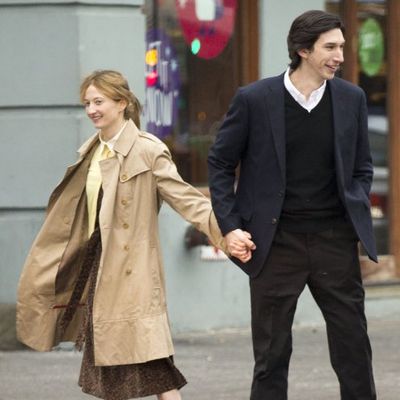
In the bizarro opening scene of Hungry Hearts, Mina (Alba Rohrwacher) accidentally walks into a tiny restaurant bathroom in which total stranger Jude (Adam Driver) is anxiously taking a massive, smelly dump. A malfunctioning door locks them in. He apologizes profusely as his bowels continue to unleash themselves, and she canÔÇÖt decide whether to giggle or vomit. ItÔÇÖs a scene so disgustingly nutty that you could be forgiven for thinking youÔÇÖre about to watch a scatological rom-com for the ages.
But no. The film flashes forward from that gross-out meet-cute to a few months later. Jude and Mina, now an item, are in bed. She finds out that sheÔÇÖs being transferred for her job. They have a somber heart-to-heart about whether their relationship can continue. Then she discovers sheÔÇÖs pregnant, and the next thing we know, theyÔÇÖre getting married at a restaurant on Brighton Beach. WeÔÇÖre not sure that these two belong together, but the corporeal compels them ÔÇö from his bowels in that opening scene to her pregnancy test (presented with a shot of her on the toilet bowl) and beyond. MinaÔÇÖs refusal to eat meat or any kind of protein threatens the pregnancy. She insists on having a natural childbirth, but at her weight, itÔÇÖs risky. After the baby is born, it has difficulty thriving. Mina builds a rooftop garden in their apartment building, where she grows organic produce and medicinal herbs free from the poison she fears the city is spreading. But the childÔÇÖs lack of growth pushes the couple into conflict: Doctors tell Jude that he needs to feed the baby meat and store-bought products ÔÇö all the spoils of modernity that his wife fears so much.
It gets stranger and stranger from there, and what began like a romantic comedy, then transformed into a moody relationship drama, now starts to become something else entirely: a stylized thriller from a student of PolanskiÔÇÖs Repulsion and Todd HaynesÔÇÖs Safe, with a bit of HitchcockÔÇÖs Marnie thrown in. Director Saverio Costanzo, who starts off the film preferring intimate, eye-level long takes, begins to use wider and wider angles, distorting the image to unreal degrees. Before our eyes, Driver and Rohrwacher go from a pleasant, awkward young couple to two elemental sides in constant opposition ÔÇö slowly, subtly, but unmistakably, they war with each other. The acting awards these two young performers received at last yearÔÇÖs Venice Film Festival were well deserved.
ThereÔÇÖs something else about the filmÔÇÖs approach thatÔÇÖs captivating. One of the most fascinating things one hears about the human body is what a complicated, impressive machine it is, and yet so quiet: Our body barely ever makes a sound, even as it churns away in bewildering complexity beneath the fragile surface of our self. By foregrounding bodily processes, by keeping the fact that weÔÇÖre living, breathing organisms at the center of his film, Costanzo creates something wildly discomforting and new ÔÇö an existential body horror relationship drama.
Based on a novel by Marco Franzoso, Hungry Hearts is a riveting, relentless film. It may also be an infuriating one, and not always in a good way. The film starts off in observational mode, but it soon drifts towards JudeÔÇÖs side. As he becomes more and more desperate to save his child, his wife starts to feel almost like a demon ÔÇö a constant presence judging him, undercutting him, maybe even threatening him. Any couple who has had disagreements over how to take care of a child or even what they themselves should be eating can find something to relate to here, but as the film drifts more and more into the realm of a thriller, it privileges one point of view over another. That probably wonÔÇÖt sit well with everybody, and I imagine an equally fascinating film could be made of couples arguing over what they thought of this one.
But Hungry Hearts is too smart just to stop there. In its final scenes, it starts to complicate what itÔÇÖs been telling and showing us. The stylization suggests subjectivity ÔÇö and thus, potentially, unreliability. ItÔÇÖs a subtle shift, but one scene in particular near the very end suggests that thereÔÇÖs more to this world than weÔÇÖve been shown up to this point. But then, just as suddenly, the film pulls us out of that and into something else, with one final twist. Hungry Hearts is a troubled, troubling movie. The unrest it creates looms long after the end credits have rolled.


